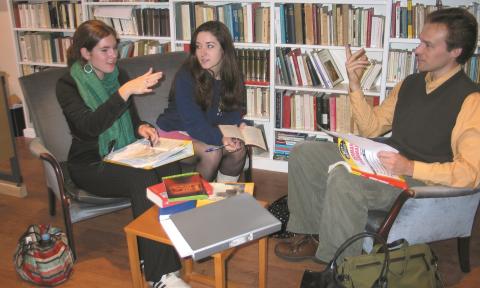The Russophone world includes over 250 million speakers globally, and Russian-language literature and culture appeal to a wide variety of interests. At Oxford, you can study Russian from scratch, or continue from A-level (or equivalent) standard; you can study Russian by itself, or in combination with another European or Middle Eastern language, or with subjects including History, English or Classics. The Oxford Russian course will equip you with deep knowledge and understanding of Russian language and Russophone cultures, both in the classroom and on the undergraduate year abroad in Russian-speaking countries in Central Asia, the Caucasus and the Baltics, developing skills of major significance in today’s international context. Our graduates can be found in every profession, from the civil service, diplomacy and law to academia, journalism, the arts and even stand-up comedy.
During your Russian course here, you will read some of the greatest works of global literary culture in the original, and acquire an in-depth command of one of the world’s most widely spoken and challenging languages. The range and the flexibility of the Oxford undergraduate and graduate courses provide subjects for rewarding study which might include, for example, the novels of Tolstoy and Dostoevsky, Pushkin’s poetry, the works of female writers including Petrushevskaya and Tsvetaeva, or contemporary Russophone literature from around the world; the history of the Russian language and its development up to the present day; works from the Medieval and Enlightenment periods, as well as the Soviet and Post-Soviet periods; and topics in gender, film, theatre, the visual arts and music. There is also the possibility of learning further Slavonic languages as part of your Russian course, including Ukrainian, Czech and Polish.
The Oxford Slavonic Sub-faculty is one of the largest and most distinguished Slavonic departments in the world, with nine full-time faculty members engaged in research across medieval, early modern, and modern Russian and Russophone literature; Slavonic linguistics, and Czech, Slovak, Polish and Ukrainian language, literature and culture. There are particular strengths in literary and cultural history of the 18th to 21st centuries; comparative literature; biography; gender studies; historical linguistics; and digital humanities. Major recent research projects and public engagement activity involving members of the sub-faculty include the AHRC project Creative Multilingualism; the Digitized Correspondence of Catherine the Great (CatCor, Andrew Kahn); a 1000-page History of Russian Literature (2018), co-authored by Andrew Kahn; ‘Syntacticus, a Treebank of Early Indo-European Languages’ (Hanne Eckhoff); ‘Postcolonial Identities in Central Asian and Caucasian Literature’ (Tamar Koplatadze); ‘A Brave Life: Transgender and Queer Erasure in Russian Culture’ (Margarita Vaysman); ‘Banishment and Belonging: the 101st kilometre in Russia, Ukraine, Latvia and Kazakhstan’ (Polly Jones). Philip Ross Bullock's work on Russian song has been supported by a British Academy Mid-Career Fellowship and a EURIAS Senior Fellowship at the Institute for Advanced Study, Paris, and a recent TORCH Knowledge Exchange Fellowship has supported a co-curated series Rachmaninov Song at Wigmore Hall, London.
Our academics often write for the press (e.g. Polly Jones on The Death of Stalin in the ‘i’ paper, Tamar Koplatadze on Georgian film in The Calvert Journal) and broadcast on radio and television (e.g. Andrew Kahn on Eugene Onegin for BBC 4; Tamar Koplatadze on Central Asian and Caucasian Literature for BBC3). They appear as expert advisors and commentators on theatre and opera productions, as well as Hollywood films (e.g. Julie Curtis and Philip Ross Bullock at Garsington Opera, Polly Jones as an advisor for Armando Iannucci’s The Death of Stalin, Tamar Koplatadze for Nosferatu, 2024, and various film festivals). Members of the Sub-faculty are also active in literary translation, with Oliver Ready the recipient of a number of international translation prizes. Further details about our research can be found here, and a selection of recent publications is here.
Russian undergraduates and graduates benefit from a large and lively community in the university and the city of Oxford. A wide range of Russian-related activities and events take place throughout the year in Oxford, from the Sub-faculty’s weekly research seminar, to regular international conferences, Russian film showings, and author visits.

Undergraduate Studies

Graduate Studies

Research